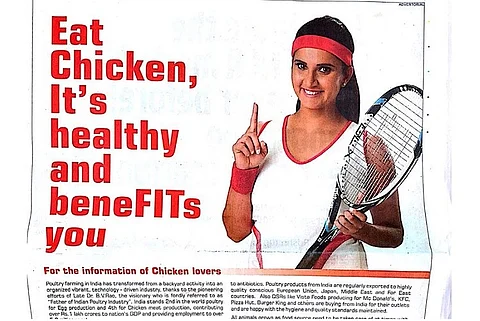

On February 27, 2018, a full-page advertorial appeared in Times of India, featuring ace tennis player Sania Mirza. The ad read, “Eat chicken, it’s healthy and beneFITs you.”
The advertorial, which was by All India Poultry and Development and Services Private Limited, claimed that “vested interests from Western countries” were trying to spread “false and misleading information alleging indiscriminate use of antibiotics” in poultry, to make headway into India’s industry.
#FakeNews by Indian #poultry #industry. Using @MirzaSania to claim that poultry industry is not misusing #antibiotics. Misrepresenting @CSEINDIA study results to support that #chicken is safe. Read our rebuttal: https://t.co/PZHHN12rD8 pic.twitter.com/AUr3M7e9sw
— Chandra Bhushan (@Bh_Chandra) February 27, 2018
The motive behind the ad was quite clear – to ensure readers that relevant standards were being followed in the Indian poultry industry and to promote consumption of chicken.
However, the ad landed in trouble, and with it, Sania Mirza, when the Centre for Science and Environment (CSE) as well as the The Advertising Standards Council Of India (ASCI) pulled it up for stating “misleading” information. As a result, CSE has also asked Sania Mirza to publicly disassociate herself from the campaign.
The advertorial quoted a CSE study from 2014 to say that there was no misuse of antibiotics in the poultry sector, when the study in fact, says the opposite.
In a statement issued on Monday, CSE said that it welcomed ASCI classification of the advertorial as “misleading” and its mandate for the advertorial to be withdrawn or modified by May 23, 2018.
ASCI had said that by misrepresenting the results from the CSE study, the ad contravened the Code on “Truthful and Honest Representation”.
“Mirza is a youth icon – she must recognize the public health threat that antibiotic misuse in food animals poses, and refrain from associating herself with such fabrications of the truth,” the CSE statement said.
Good news! @ascionline upholds HSI/India's complaint against the ad on chicken consumption featuring @MirzaSania & asks them to withdraw it. Read here: https://t.co/steMqzgWeC pic.twitter.com/SWxiYqK23c
— HSI/India (@IndiaHSI) May 18, 2018
The complaint against the advertorial was filed by Humane Society International India to the ASCI. “We are happy with the decision by ASCI. It reaffirms what we had categorically said that the advertisement was misleading the people of this country. It was wrong in telling that the poultry sector is not misusing antibiotics, which is absolutely different from the ground reality,” said Chandra Bhushan, deputy director general, CSE.
Earlier, CSE had written a letter to Sania dated March 6, 2018 as well, urging her to distance herself from the advertorial. Read it here.
Debate over misuse of antibiotics in poultry farming
There have been several reports over the years which criticise the heavy use of antibiotics in Indian poultry.
The CSE study from 2014, which tested 70 samples of chicken from Delhi-NCR region found that antibiotic residue was found in 40% of them. And in 17% residue of more than one antibiotic was present.
The study pointed to large-scale unregulated use of antibiotics in poultry industry.
Another investigation by The Hindu and the Bureau of Investigative Journalism in published in January 2018, revealed how chickens in Hyderabad were fed antibiotics which would supposedly help them gain weight faster, helping poultry farmers increase their profits.
One such drug given to chickens is colistin, which is known as the ‘last hope’ drug – it is given to human patients who are critically ill with infections that have developed resistance to all other drugs.
The WHO has asked for such drugs, which are critical to human medicine, to not be used as growth promoters in poultry. This is to prevent bacteria from becoming resistant to these drugs, which would ultimately make patients harder to treat with life-saving drugs such as colistin.
Furthermore, there seems to be a lack of regulation on how much antibiotic residue it permissible in poultry, and on antibiotic use in the industry as well. Chandra Bhushan, CSE’s deputy director general and head of the lab, said, “Public health experts have long suspected that such rampant use of antibiotics in animals could be a reason for increasing antibiotic resistance in India. But the government has no data on the use of antibiotics in the country, let alone on the prevalence of antibiotic resistance.”